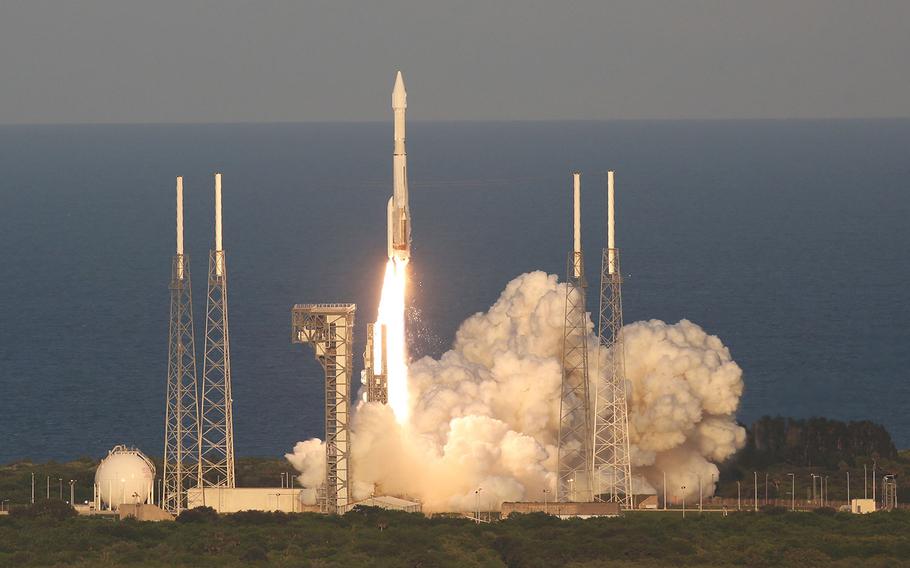
The United Launch Alliance Atlas V rocket blasts off on Thursday, Sept. 8, 2016, carrying the OSIRIS-Rex spacecraft from Cape Canaveral Air Force Station's Space Launch Complex-41. (Red Huber, Orlando Sentinel/TNS)
Every once in a while, when our national need is high, when threats become pervasive, and when nerves start fraying, an extremely valuable — let us call it “priceless” — satellite is launched into highest orbit, assuring Americans can see far and wide, and sleep at night. Our national security depends on these special satellites, what experts call “national technical means.”
Broadly speaking, these national technical means may cost in the range of $500 million, many multiples of the cost of a launch, but they are worth every penny. Why then does Congress fume about launch costs, when the real question is elsewhere? The real question must be: How do we assure America does not lose precious cargo — or worst still, people — in a failed launch?
Let’s get more specific. The Wall Street Journal recently reported that the cost and risk balance may be wildly out of whack. The question is not how much a launch costs, but what risk is tied to failed launches of precious cargo or people. Put differently, what is the cost to America — in qualitative, quantitative, security and human terms — of having a failed launch that destroys “priceless” national technical means, or priceless Americans? Can there be any doubt? The cost of such a calamity is incalculable, and that means we must do all in our power to avoid it.
The national paper further reported, “months before an unmanned … rocket exploded on the launch pad during a routine fueling exercise in September, a NASA advisory committee raised red flags.” Exactly what was raised is not clear, but plainly the idea was that policymakers should put value of precious cargo over any cost-saving from a quick, novel or theoretically less expensive launch. The Wall Street Journal concluded that this committee “met and issued further strong warnings” after the recent explosion, specifically about “transporting U.S. crews into orbit.” The same concern, obviously, applies to placing “priceless” national technical means — or satellites — in space. We simply cannot afford the loss.
So what is the best approach? What would minimize risk, and properly account for all costs — not just the cost of launch? The Wall Street Journal does not provide an explicit answer, but readers may infer one: If the precious cargo — irreplaceable satellite or human beings — are at risk of being destroyed in a rocket launch, especially one selected for cost savings, all more reliable options should be considered. In this instance, until reliability is clear, what works should be selected over what is cheaper.
And what works? So far, we know of that one rocket engine gets to deep space without inordinate expense, and with proven reliability. That engine is the RD-180, a Russian-made and unique rocket engine. While the Europeans and Chinese have capable rockets, and the American Delta IV can provide heavy lift at much higher launch cost, the RD-180 with an Atlas V rocket has worked dependably.
So, to protect the nation’s most precious cargo, what should Congress do? Indeed, to keep us secure at night, and at all times, how can Congress assure that essential national technical means are placed in the right orbit at the right time, with minimal risk? The answer is not hard. Congress should assure that no limits are placed on access or use of RD-180 engines, and should affirm that simple understanding — and the implications that attend it — in the pending National Defense Authorization Act. If they do so, the security of our most precious cargo — material and human — will be one step closer to being protected. If they let this slide, we can expect one day to be praising the NASA Advisory Committee for having been prescient in predicting an avoidable tragedy. Let us all sleep better, and ask Congress to make the right choice.
Steven L. Mosteiro is a former strategic planner, policy analyst and missile defense expert with the U.S. Office of Secretary of Defense and the Office of Secretary of the Air Force.